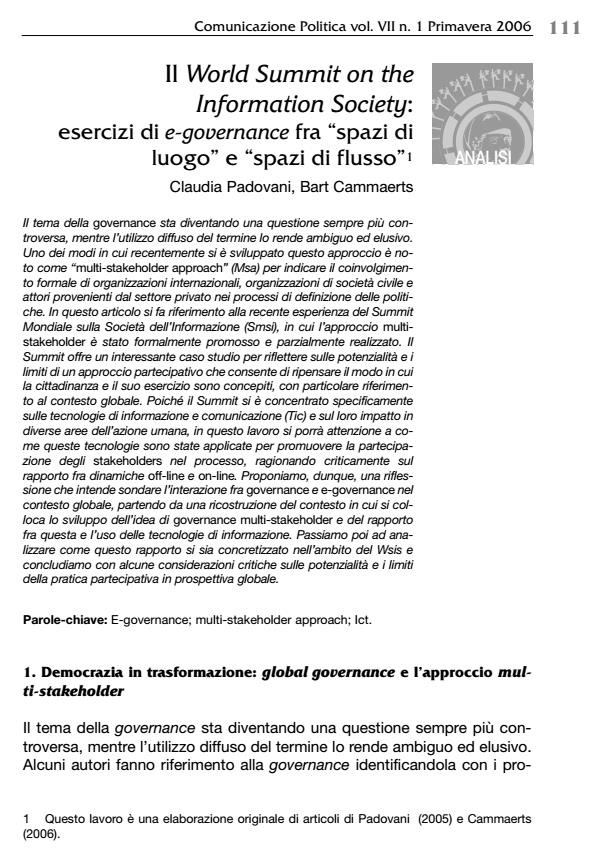Il world Summit on the information Society: esercizi di e-governance fra spazi di luogo e spazi di flusso
Titolo Rivista COMUNICAZIONE POLITICA
Autori/Curatori Bart Cammaerts, Claudia Padovani
Anno di pubblicazione 2006 Fascicolo 2006/1
Lingua Italiano Numero pagine 20 P. 111-130 Dimensione file 117 KB
DOI
Il DOI è il codice a barre della proprietà intellettuale: per saperne di più
clicca qui
Qui sotto puoi vedere in anteprima la prima pagina di questo articolo.
Se questo articolo ti interessa, lo puoi acquistare (e scaricare in formato pdf) seguendo le facili indicazioni per acquistare il download credit. Acquista Download Credits per scaricare questo Articolo in formato PDF

FrancoAngeli è membro della Publishers International Linking Association, Inc (PILA), associazione indipendente e non profit per facilitare (attraverso i servizi tecnologici implementati da CrossRef.org) l’accesso degli studiosi ai contenuti digitali nelle pubblicazioni professionali e scientifiche.
<i> The World Summit on the Information Society: exercises of e-governance between place spaces and flux spaces</i> (By Claudia Padovani and Bart Cammaerts) - ABSTRACT: Governance is increasingly becoming a contested notion, whereby the different meanings of the concept make it intangible, elusive. Nevertheless this is a central topic to better understand developments related to participation and citizenship in contemporary societies; thus defining the broader context in which to locate the use of information and communication technologies in support of participatory practices. Some refer to governance as being regulation, others relate it to codes of good conduct by business actors and public institutions as in good governance and other authors place the notion of governance central in democratising global and regional politics, through participatory mechanisms allowing non-state actors to take part in policy processes. One of the recent modalities to put this approach in practice has come to be known as multi-stakeholder approach (Msa). In this article we look at the recent experience of the World Summit on the Information Society (Wsis), in which the Msa has been formally promoted and partly realized, as a case study to identify potentialities and shortcomings of an approach which could be seen as a way to re-think the way in which citizenship is conceived, especially in the global context. Having the Wsis focused specifically on information and communication technologies (Icts) and their impact in different areas of human activity, we also pose a special attention on how these technologies have been applied to promote stakeholders’ participation in the process. This reflection aims at assessing the interplay between governance and e-governance in global politics, starting from a reconstruction of the context within which the idea of multi-stakeholder governance has been developed and discussing the relation between such approach and the use of information technologies. We then proceed analysing how this approach has been realized in the Wsis process; to conclude with critical remarks on potentialities and limits of participatory practices in a global context.
Bart Cammaerts, Claudia Padovani, Il world Summit on the information Society: esercizi di e-governance fra spazi di luogo e spazi di flusso in "COMUNICAZIONE POLITICA" 1/2006, pp 111-130, DOI: